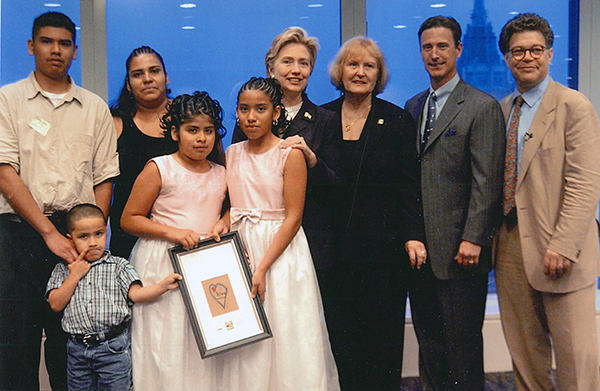In the Spring Connect article commemorating the 50th anniversary of the Department of Family Social Science, I was only able to briefly touch on the work of then-professor Pauline Boss, (now-professor emeritus), and then-graduate students Tai Mendenhall (now UMN professor), Christina McGeorge, Beverly Wallace, John Beaton, Kristen Holm and Jerica Berge (now UMN professor), as well as past faculty members William Turner and Elizabeth Weiling. This addition adds details not previously published.
Julie Michener
In September 2001, the excitement of the new academic year would be overshadowed by the national tragedy of 9/11. The attacks of September 11 would bring family social scientists into the heart of the national tragedy just days after the attacks.
Pauline Boss received a phone call from former student Lorraine Beaulieu Fishman, now living in Washington, D.C. Her husband, Mike Fishman, was president of the 70,000 member Local 32-BJ of the Service Employees International Union, had asked her to find help for his members and their families, who were among the many Twin Tower workers. About 350 were working at the towers on the morning of September 11 and 27 were among the missing.
Boss assembled a team that included Turner, Wieling and graduate students Christine McGeorge and Tai Mendenhall, for the first trip to Ground Zero just days after the attack to help members of the service workers union and their families cope with the loss and trauma. Two additional trips that fall would include graduate students Beverly Wallace, John Beaton, Kristen Holm and Jerica Berge. Drs. Boss and Wieling would return in February 2002.

“The scene was indescribable,” says Boss. “The smell and the wreckage and utter senselessness. During the first trip – we mostly listened as individuals and families told their stories and tried to make sense of it.”
Over the course of the three trips, Boss and her teams organized and conducted “family meetings” with those who had missing loved ones.
“We allowed them to define who family was,” says Boss. “So we would have up to three generations in the room, children included.”
Boss and her team also conducted ambiguous loss workshops for 100 New York therapists and social workers so they could continue to work with survivors and families of those lost in the attacks.
“We were doing outreach, but frankly, the people we were serving were teaching us along the way too,” says Boss. “We learned the importance of remaining flexible in a highly chaotic and emotionally stressful situation.”
“It changed the trajectory of my career,” says Mendenhall who would join the U’s Family Medicine faculty following graduation and eventually return to FSOS in 2007. “It felt like we were learning to build the ship as we sailed it and I have carried those lessons forward throughout my entire career.”

In July of 2004, Pauline Boss and U.S. Sen. Hillary Rodham Clinton (pictured center) were honored at a gala in New York City for their work in helping the city heal after the Sept. 11th terrorist attacks. The College of Human Ecology co-hosted a fundraiser with two New York labor unions to raise money to establish the Endowed Chair in Family Stress and Resilience in CHE. The chair will provide opportunities for discover-ing knowledge and developing resources for healing families and communities throughout the world. Then-comedian Al Franken (far right) emceed the event. They are pictured here with 9-11 families.
For her work with the families who lost loved ones in the World Trade Center attacks on September 11, Boss would be honored with the 2002 Humanitarian Award, SEIU Local 32 BJ, the National Council on Family Relations 2002 Ernest Burgess Award, and the UMN College of Human Ecology 2002 Excellence in Outreach and Engagement Award.
Read more about Family Social Science
Read the entire story, “Responding to the Needs of the Time,” in the Spring Connect magazine.



